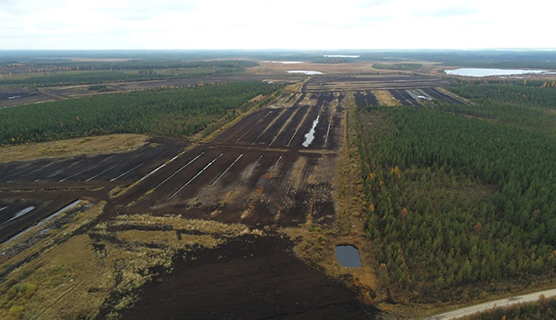
© Isra Alatalo
This year's exceptional weather conditions, such as the floods in Germany, have drawn attention to the inefficiency of dams and flood walls in the flood management. Instead of these, Professor Daniel Hering from the University of Duisburg-Essen, is calling for measures including the restoration of river flood plains which, in addition to protecting against floods, also slow the biodiversity loss and improve the state of waterways.
Professor Hering leads the MERLIN project, which was launched in October, which aims to restore waterbodies and catchment areas in different parts of Europe, while applying best practices of nature-based solutions. The project identifies new, extensively applicable practices for restoring ecosystems to their natural states, and for improving carbon sequestration. The four-year project involves 44 organisations: universities, research institutes, nature conservation organisations, advocacy groups and other stakeholders.
“Nature has undergone intense modification also in Finland, and cross-sectoral cooperation is needed”, says Kristian Meissner, director of the strategic research programme on environmental information at the Finnish Environment Institute SYKE. Meissner coordinates SYKE's part of the research project.
Ecological restoration around Europe
Of the € 21 million in funding from the Horizon 2020 Green Deal, € 10 million is to be used for natural ecosystem upgrades around Europe, from Finland all the way to Israel. Experiences of the best nature-based solutions found so far in the 17 main target areas of the project are being collected and broadly monitored to ascertain their effectiveness. Restorations are assessed and compared to find the best practices.
”The MERLIN project’s stakeholders are working in cooperation and participate in the planning of measures and the evaluation of results”, says SYKE researcher Maria Ojanen, who is developing stakeholder activities linked with the project at the European level. In addition to the effects on nature and the climate, attention is also paid to the economic and social sustainability of the restoration projects.
The societal significance of the target areas, biodiversity improvement, and reducing emissions affecting the climate and waters are central to the project. The effects are evaluated using shared, globally accepted indicators, so the method can be scaled up and applied from the local level all the way to the European level.
New life for the Komppasuo peat production area
Restorations will be done throughout Europe in areas including peatlands, bogs, wetlands, flowing waters, and catchment areas of different sizes. In Finland’s case the after-use of Komppasuo peat production area will be planned and implemented. Komppasuo is located in the Kuivajoki catchment area, and it is managed by Neova Oy.
“The rapid shutdown of peat extraction came as a surprise to the actors in the field, and extraction was halted in many areas even though much peat remained in the ground. This also poses challenges for successful after-use and for the environment, when the area moves to new use”, says Seppo Hellsten, Development Manager at SYKE. Setting up peat fields in former peat extraction areas, for example, would lead to more greenhouse gas emissions, and nutrient loads to water systems can be significant.
After-use and restoration measures at Komppasuo will be planned by Tapio Oy, which specialises in water protection management, in collaboration with the land owner and the supervisor of the environmental permit. Different stakeholders will also be able to affect the planning of the measures.
“In addition to ordinary ash fertilisation and reforestation, we will set up wetlands in Komppasuo and, if possible, trial Sphagnum moss cultivation”, says Tiina Ronkainen from Tapio. Several national projects are under way to find the best options for after-use of peat production areas. Peat extraction is being shut down in Finland and elsewhere, so the results of the project can be applied throughout Europe.
More information
Inquiries
Senior Scientist Anna-Kaisa Ronkanen, Finnish Environment Institute, forename.surname@syke.fi,
tel. +358295 251 216
Director Kristian Meissner, Finnish Environment Institute, forename.surname@syke.fi,
tel. +358295 251 422
Development Manager Seppo Hellsten, Finnish Environment Institute, forename.surnamei@syke.fi,
tel. +358295 251 165
Samuli Joensuu, Tapio Oy, forename.surname@tapio.fi,
tel. +35840 5341 043
Tiina Ronkainen, Tapio Oy, forename.surname@tapio.fi,
tel. +35850 3229 566